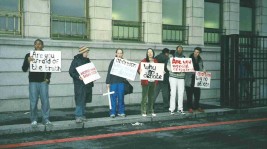Unfortunately, not everything heard in politics is true. Repeating false information can cause you problems. The internet opens up publishing to everyone, but because there is little accountability on the net – it spreads rumours faster than ever before. A lot of them are false.
Sources of false information
- Hoaxes – Hoaxes are started by people who deliberately spread lies as a joke or to discredit their enemies.
- Rumours – Often people (including Christians) oversimplify or exaggerate facts. There may be an element of truth, but it is communicated badly.
- Bad research – Your sources may not have checked their information.
- Mishearing – You may not hear correctly what someone said – especially with verbal communication.
- Quoted out of context – Someone may be quoted out of context to sound like something they didn’t mean.
- Plan fell through – you heard plans correctly, but something went wrong and it did not happen as expected.
Why stop false information?
We must take precautions against distributing false information because:
- It breaks the ninth commandment “You shall not give false testimony against your neighbor.” Exodus 20:16
- It can harm your credibility with allies and opponents – thus weakening your strength when you have something real to complain about.
- It can hurt an innocent person.
- It can waste your time and energy on something that is not a real problem.
- You could get sued.
How to be more accurate
- If an accusation is unproven, say it was ‘alleged to have been done’.
- The more controversial, the more carefully you must double-check facts.
- Find where others got their information from. The fact that many people confirm something does not make it correct – especially if they all use the same source such as a rumour mongerer or incorrect article. Check the references of articles.
- Check suspected hoaxes at http://www.urbanlegends.about.com/
- Quote your own sources, so if anything is in error, it is their fault and not yours.
- Rate the credibility of sources according to their track record.
- Ask an expert to check your work.
- Ask people to confirm or deny what you thought you heard them say. This also gives them a chance to retract.
If you make a mistake
- Unfortunately, you will make mistakes. You don’t have time to research everything back to original sources.
- If you did repeat incorrect information, you must apologise and correct to those you told. This helps repair any damage and in the long term creates trust with those who hear you.


